Spaceflight, Astronautics, and Astronomy
The Linden Springs Rocket Restaurant
The Linden Springs Rocket Restaurant, located in Staunton, Virginia, opened in 1959. A full-size, neon-lit rocket stood outside of it.Going along with the theme of being a restaurant of the future, it boasted that it served food "cooked by radar." By this it meant that the food was microwaved.
This has to be one of the few times that a restaurant has actually bragged about serving microwave-cooked food.
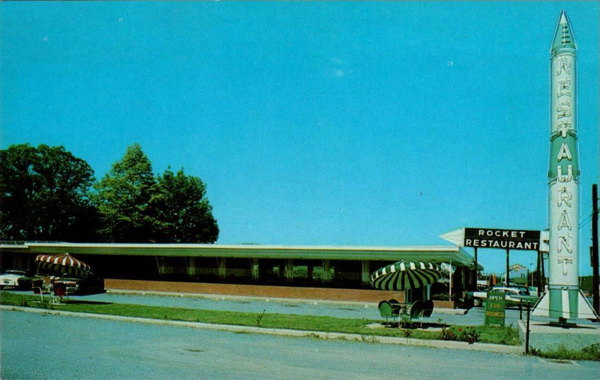
image source: hippostcard.com
The restaurant went out of business in the 1970s, and the rocket was taken down. I haven't been able to find out where it ended up.
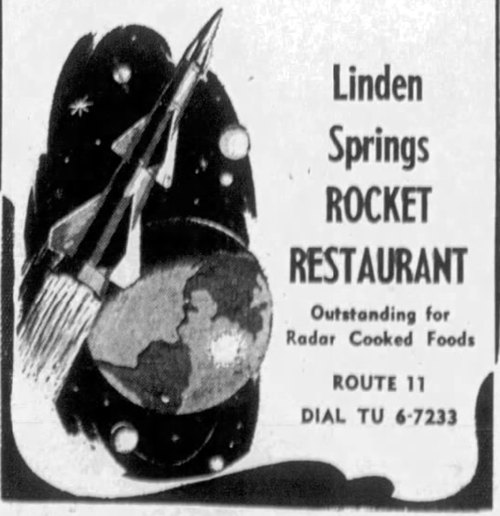
Staunton Daily News Leader - Nov 20, 1959
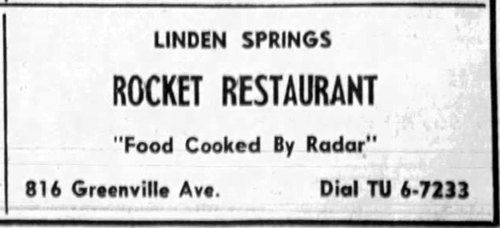
Staunton Daily News Leader - Nov 2, 1959
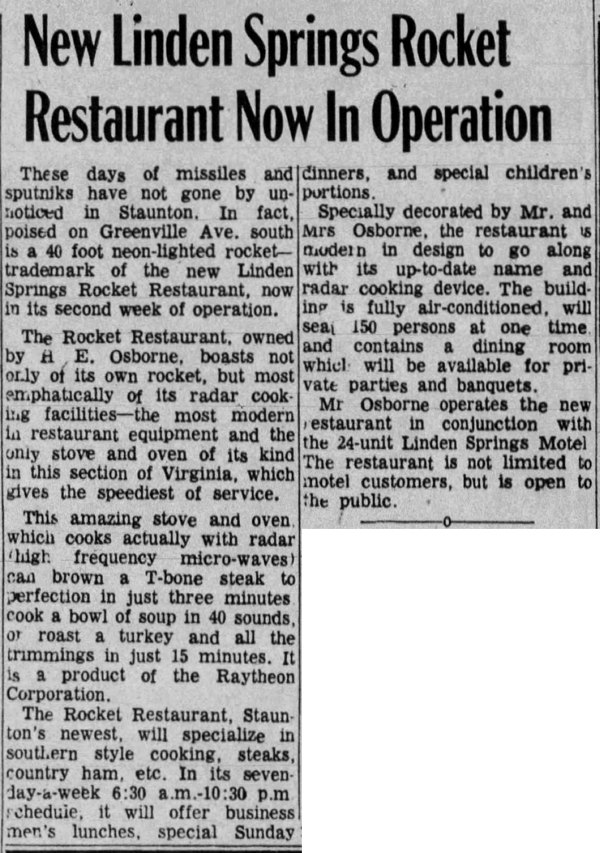
Staunton Daily News Leader - July 31, 1959
Posted By: Alex - Thu Nov 02, 2023 -
Comments (4)
Category: Restaurants, Spaceflight, Astronautics, and Astronomy, 1950s
Meat-Nik
Sep 1958: The National Live Stock and Meat Board's response to the launch of Sputnik was the creation of "Meat-Nik," aka "intercontinental bologna missile."
The National Provisioner - Sep 6, 1958

The National Provisioner - Sep 20, 1958
Posted By: Alex - Sun Oct 22, 2023 -
Comments (0)
Category: Food, Spaceflight, Astronautics, and Astronomy, 1950s
GI Joe Does “2001: A Space Odyssey”
Posted By: Paul - Fri Oct 13, 2023 -
Comments (3)
Category: Movies, Spaceflight, Astronautics, and Astronomy, Toys, 1970s
The Distant Galaxy
Spacey, man!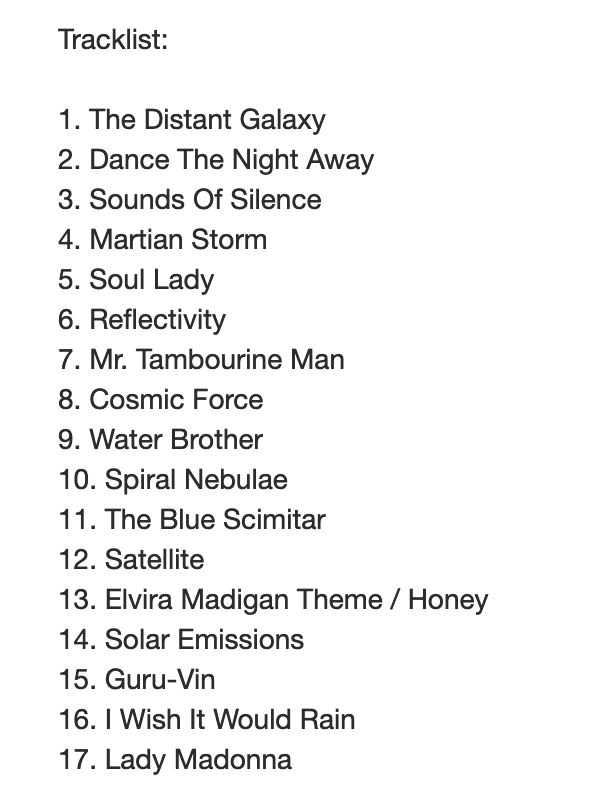
Posted By: Paul - Sun Sep 24, 2023 -
Comments (0)
Category: Music, Space-age Bachelor Pad & Exotic, Spaceflight, Astronautics, and Astronomy, Vinyl Albums and Other Media Recordings, 1960s
The Possibility of Life inside Stars
The conventional wisdom is that if sentient life exists elsewhere in the universe, it probably lives on another planet. But in 2020, the physicists Luis Anchordoqui and Eugene Chudnovsky argued that we should consider the possibility that life (including technologically advanced civilizations) might exist inside stars.Their argument relies upon a very expansive view of the definition of life. They admit that biological life couldn't exist inside a star, but they argue that high-energy physics supplies various "nuclear objects" such as "strings, monopoles, and semipoles" that might be able to encode information and form a self-replicating system (i.e. life).
Their hypothesis is, of course, highly speculative, but they suggest it might provide an explanation for a previously unexplained phenomenon observed in some stars:
“There are no theories that explain it,” Chudnovsky said. “So maybe it’s a very complicated process related to the function of a civilization inside the star.”
If a star harbored a nuclear civilization within it, he explained, the energy used to sustain that civilization would cause the star to cool and dim faster—in effect speeding up the aging process. And, at some point, the star would no longer produce enough energy to sustain this form of life.
More info: Lehman College News Center; "Can Self-Replicating Species Flourish in the Interior of a Star"
Posted By: Alex - Sun Sep 10, 2023 -
Comments (1)
Category: Aliens, Spaceflight, Astronautics, and Astronomy
GI Joe Astronaut
As humanity ventures further into space, surely Hasbro could revive this toy.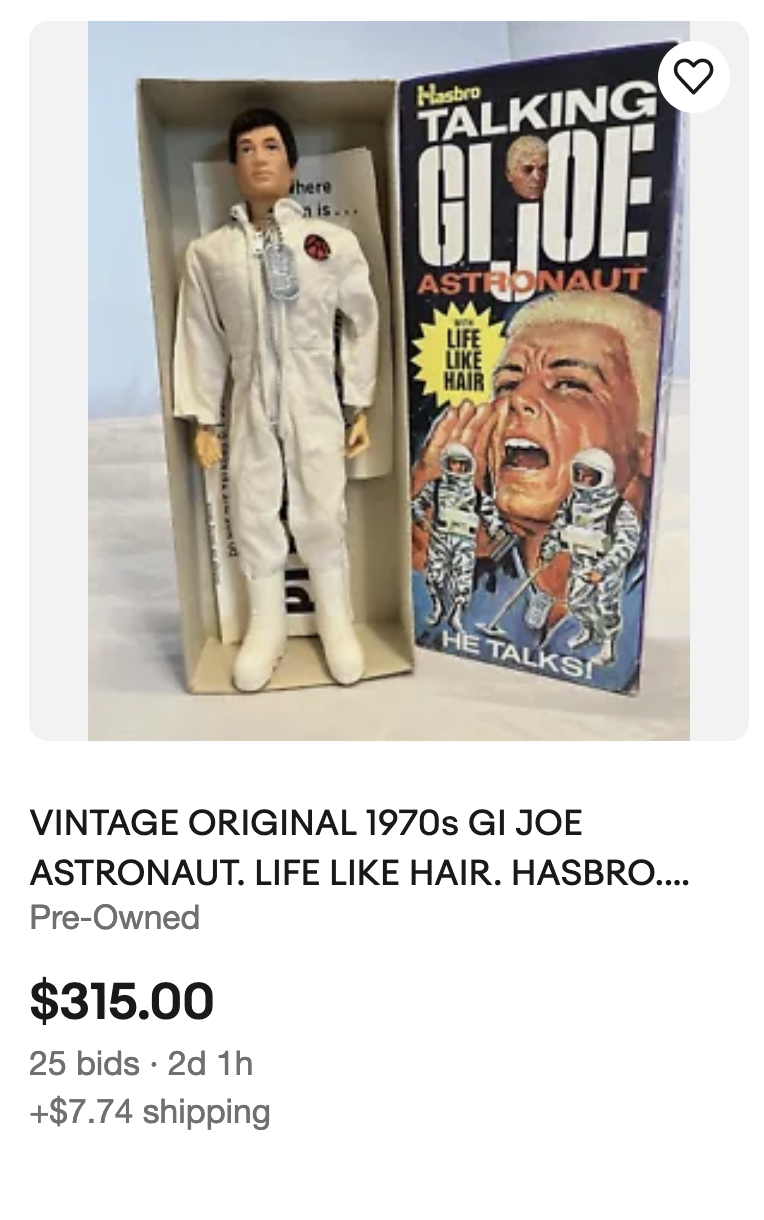
Posted By: Paul - Sat Jul 01, 2023 -
Comments (1)
Category: Spaceflight, Astronautics, and Astronomy, Toys, Dolls and Stuffed Animals, 1960s
Glenda Lawrence, “America’s First Space Housekeeper”
Now that NASA has selected a new crew for the Moon mission, I hope they have not neglected to fill this role.
Glenda Lawrence America's First Space Housekeeper. She Will Be Preparing Food For The Apollo 11 Astronauts Armstrong Aldrin And Collins Whilst They Are In Quarantine.
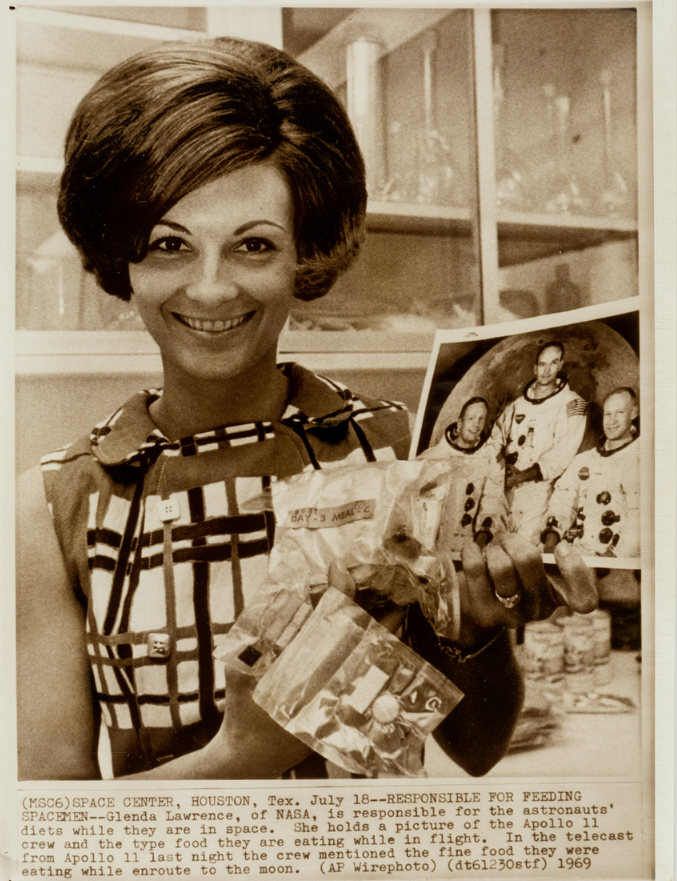
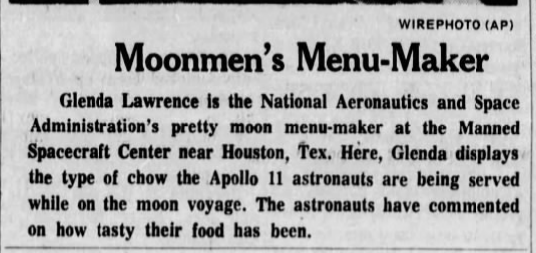
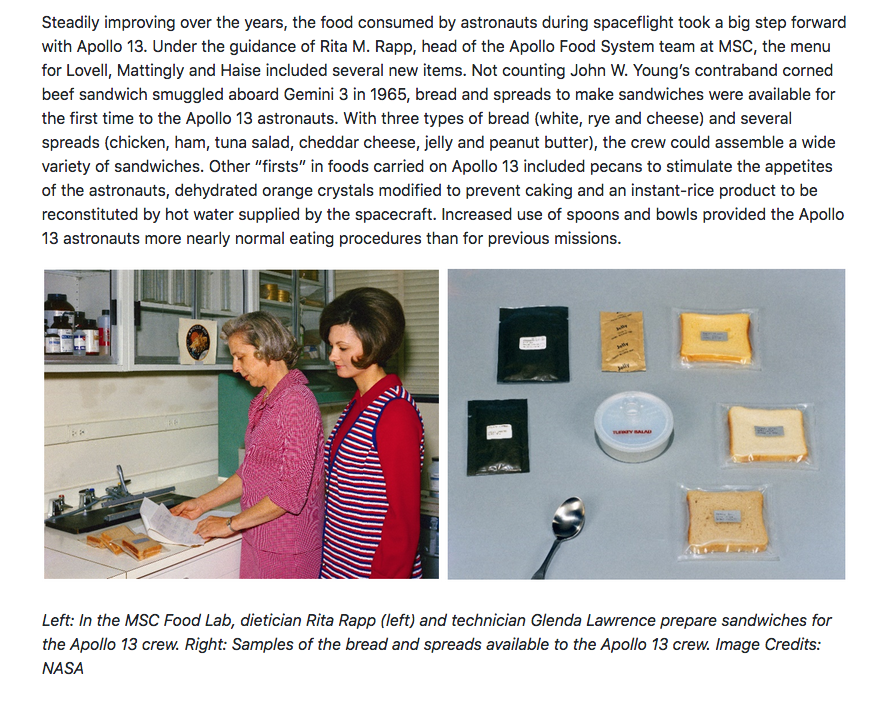
Posted By: Paul - Tue Apr 04, 2023 -
Comments (1)
Category: Domestic, Food, Spaceflight, Astronautics, and Astronomy, 1960s
The taste of food in dark isolation
Beatrice Finkelstein, a nutrition researcher at Wright-Patterson Air Force Base, conducted a series of "dark-isolation studies" during the 1950s. Subjects were placed for periods of 6 to 72 hours in a totally dark, sound proof chamber furnished with a bed, chair, refrigerator, and chemical toilet.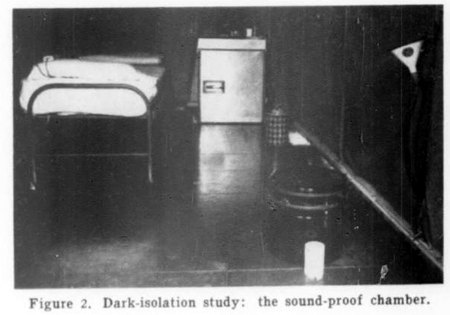
The purpose of this was to find out how astronauts might react to being confined in a small, dark space for a prolonged period of time. And in particular how their responses to food might change.
Some of her results:
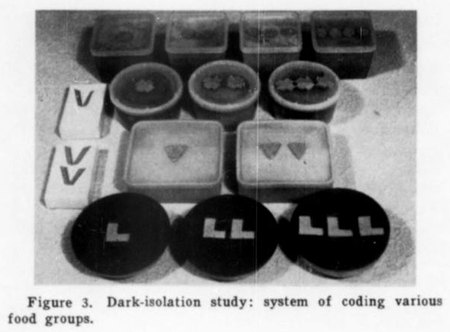
But the stranger result was how the lack of visual input completely changed the flavor of the food:
More info: "Feeding crews in air vehicles of the future"
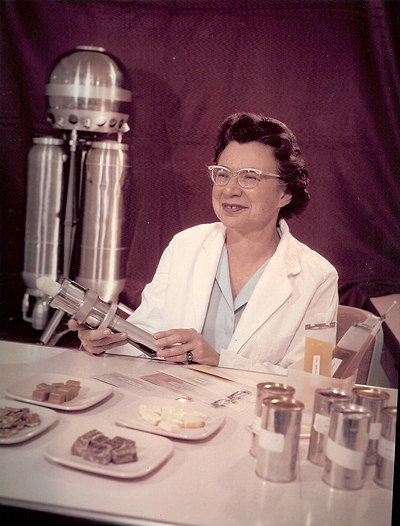
Beatrice Finkelstein (source)
Posted By: Alex - Mon Jan 30, 2023 -
Comments (4)
Category: Food, Spaceflight, Astronautics, and Astronomy, Experiments, Psychology
Follies of the Madmen #547
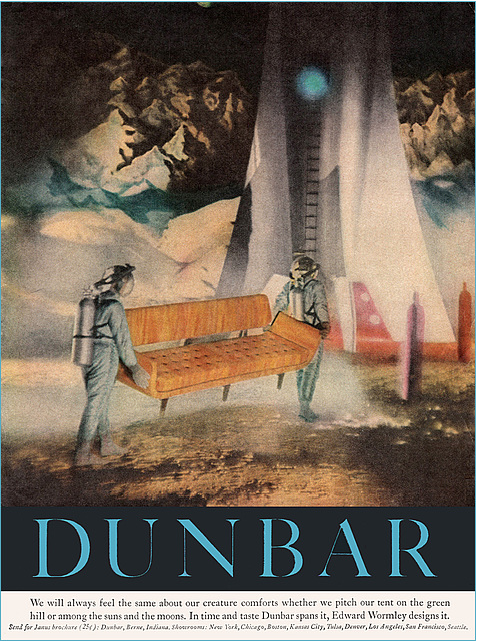
Posted By: Paul - Thu Nov 17, 2022 -
Comments (2)
Category: Domestic, Spaceflight, Astronautics, and Astronomy, Advertising, 1950s
Using an atomic water cannon to change the earth’s orbit
Back in the early 1970s, engineer William Peterson proposed builing a gigantic, atomic-powered water cannon in the Mojave Desert and blasting ocean water out of it. He claimed this would not only create rain to water the desert, but would also change earth's orbit, in a beneficial way. Eventually, he said, we could even use the cannon to move the earth to a new solar system!I've got two questions: 1) Would salt water shot up into the atmosphere come back down as fresh water? and 2) How big would you have to make something like this to actually move the earth?

Logan Herald-Journal - Nov 23, 1971
Text below from a Nov 1971 UPI article:
By Robert E. Sweet
SEATTLE (UPI) — William E. Peterson wants to erect what amounts to a giant atomic water pistol in the Mojave Desert, shoot it off and change the orbit of the earth.
Or, as Peterson himself once put it in an edition of a local Rotary Club bulletin which he edits: "Some weirdo hereabouts is campaigning for a project to fly the earth."
Peterson is a 40-year-old structural engineer who works mainly on dams and bridges. He has a sense of humor and can understand why some people might think he's a crackpot. But he is dead serious about his "earth sailing" project," which he has tried to sell to everyone from President Nixon to the Sierra Club to private foundations.
PLAN DETAILED
Peterson's plan is to build a nuclear cannon, a mile in diameter at the base, tapering off to a narrow nozzle on top. With an atomic blast that he estimates would be equal to about one million tons of TNT he would force a piston mechanism to shoot sea water out the top of the cannon at terrific speed.
He figures about 10 per cent of the water vapor would escape earth's gravity and the spray would nudge the planet's orbit in the same way jets propel a spacecraft.
The water that remained in the atmosphere, Peterson said in an interview, would act like a "giant sprinkler system" and create rain to water the Mojave Desert.
CITES PREDICTIONS
A new orbit would improve the world's climate, ease pollution problems and "put some life into Death Valley," he said.
"Some reputable scientists say we're in for another ice age in the year 2000," Peterson said, in an interview, noting that others predict all sorts of ecological disasters on the horizon.
"So some day — and maybe not too far in the future — we're going to have to know how to control the orbit to maintain at least the quality of life we know now.
"If we can't do it this way sailing "Our Great Ship Earth," how are we going to do it?"
Peterson said other potential benefits of his proposal include: — Turning the globe into a giant spacecraft and flying it to another sun when our sun burns out, which scientists estimate will be in about 5 billion years.
— Applying the same technology to other planets to bring them closer to the sun for more living space for earthlings.
— Replacing dams with sea water cannons for the sake of electrical power.
— Desalinating sea water.
EASE NATIONALISM
— Easing the excesses of nationalism by fostering a sense of international cooperation in working on the project.
Peterson said the cannon would not necessarily have to be used to alter the earth's orbit. A smaller blast of water would be just a rainmaker and the water that did not leave the structure could drive power pistons to supply electric energy. Or, a nozzle at the top could be directed in such a way as to squelch forest fires.
His plan has been a personal project with Peterson for 13 years, but only in the last few years has he begun promoting it. Among those to whom he has divulged his plan are: President Nixon, the National Aeronautics and Space Administration (NASA), the U.S. Department of Commerce, the Atomic Energy Commission, the Sierra Club, Sen. Henry Jackson, D-Wash., Washington Gov. Dan Evans, and a few private foundations.
REJECTED BY NASA
NASA rejected the plan because its political and ecological implications were beyond the scope of the agency. H. Dale Grubb, NASA's assistant administator for legislative affairs, wrote Peterson:
"It would be presumptuous and inappropriate for one nation or an agency of one nation to speculate on the accomplishment of such a project."
Brock Evans, a spokesman for the conservation-dedicated Sierra Club, replied: "Death Valley, as you know, is a national monument at the present time. Our viewpoint is that we don't always need to make the desert bloom."
Donald F. Moore, an assistant administrator of the U.S. Department of Commerce, Environmental and Science Services Administration, wrote Peterson:
"The President has asked me to review the proposal ... and give you my comments.
"Your idea of changing the orbit of the earth as a means of controlling climate and distribution of rainfall is most intriguing and certainly represents highly creative thinking on your part.
ELASTIC MEDIUM
"Experience has shown, however, that the atmosphere is a very elastic medium, and thus instead of blowing out into space like the exhaust from a rocket, it absorbs the energy and momentum from a nuclear blast and eventually returns it to the earth so that no actual motion of the earth takes place."
Peterson answered these doubts saying: "actually it would be impossible to draw this conclusion since no one has thought of the type of device I have proposed."
He believes his proposal "warrants a feasibility study," even if admittedly it is a "real futuristic idea."
"I don't feel the (federal officials) gave it a fair shake. They just discounted the ideas and did not by any means prove they wouldn't work."
Peterson said he is gaining support locally and would attempt to win voter approval by going from state to state, campaigning.
And, he added, at least his children are convinced the plan would work — they call him "Earth Pilot No. 1."
Posted By: Alex - Wed Nov 09, 2022 -
Comments (4)
Category: Really Bad Ideas, Spaceflight, Astronautics, and Astronomy, Environmentalism and Ecology, 1970s

| Who We Are |
|---|
| Alex Boese Alex is the creator and curator of the Museum of Hoaxes. He's also the author of various weird, non-fiction, science-themed books such as Elephants on Acid and Psychedelic Apes. Paul Di Filippo Paul has been paid to put weird ideas into fictional form for over thirty years, in his career as a noted science fiction writer. He has recently begun blogging on many curious topics with three fellow writers at The Inferior 4+1. Contact Us |




